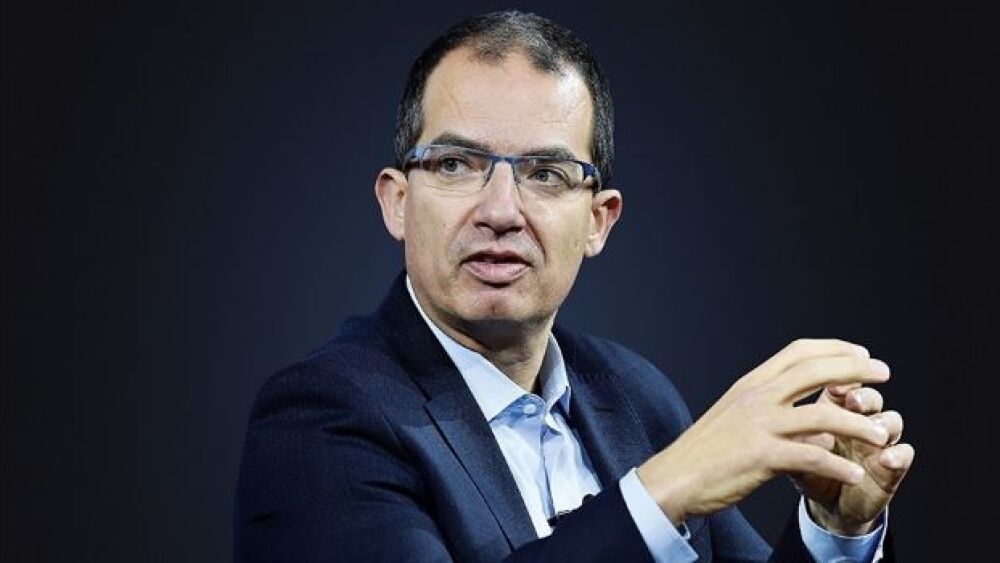Moderna’s CEO Stéphane Bancel spoke at the Boston College Chief Executives Club on Monday and recapped the laundry list of vaccines and treatments the company plans to develop.
Moderna CEO Stéphane Bancel /Courtesy of Moderna via Boston Magazine
Moderna’s CEO Stéphane Bancel spoke at the Boston College Chief Executives Club on Monday. While COVID-19 vaccine production was a big talking point for the leader of Moderna, he also touched on how mRNA technology can usher us into a longer life span, saying that he tells all of his friends to “not die” in the next ten years.
Bancel and Moderna are basking in their successes, even if they don’t currently include battling inevitable aging. Key talking points for Bancel included that the company is currently working on an mRNA vaccine candidate that can be injected into the heart to promote healing after someone has a heart attack and medicines to treat rare genetic diseases. The company also plans to release a single dose booster for COVID-19 this fall that intends to provide broad coverage against emerging variants. Finally, Bancel revealed that the company slowed down its Phase III COVID-19 vaccine study after determining the research did not have enough data on minority populations to expand its efforts in obtaining “great data” on minorities.
To that end, Moderna recently launched a new charitable foundation, aptly named The Moderna Foundation. The Foundation has an initial up-front endowment of $50 million and plans to focus on charitable programs with an emphasis on promoting public health, access to quality healthcare and educational opportunities, especially in underserved and minority populations. The Foundation has already bestowed $5 million in initial grants to five nonprofit organizations, including Boston Medical Center’s Good Grief Program, which helps provide trauma-informed and culturally responsive therapeutic care to children who have experienced loss.
Moderna has been on a roll recently when it comes to harnessing the power of mRNA vaccine technology. In March alone, the company announced a triple-threat booster against SARS-CoV-2, influenza and respiratory syncytial viruses envisioned to be given as an annual booster to provide protection against all three pathogens. It also launched a second clinical trial utilizing mRNA vaccination to protect against human immunodeficiency virus (HIV). Additionally, Moderna initiated a global public health strategy that intends to advance the development of mRNA vaccines against various infectious diseases, setting its sights on developing 15 vaccine programs that denote priority pathogens that are a threat to global health.
In February, the company introduced programs targeting the Herpes simplex virus (HSV) and varicella-zoster virus (VZV), which lined up nicely alongside its already developing vaccine programs against cytomegalovirus (CMV) and Epstein-Barr virus (EBV). Targeting these viruses stands to make a huge change in global public health by preventing potentially fatal infections and long-term consequences such as autoimmune diseases, the pathogenesis of which has been recently connected with EBV.
But Moderna isn’t stopping there. The company is developing dozens of other mRNA vaccines, some of which are tackling diseases that were previously not thought of as vaccine-preventable or treatable. The company website lists at least four mRNA vaccines in development for cancer, including a personalized cancer vaccine that could help cancer patients avoid relapse by introducing predicted cancer mutations to the immune system to elicit a response. Moderna also has vaccines in development for autoimmune diseases, which intend to provide immune homeostasis to those inflicted.
Combating infectious, cancerous and autoimmune pathology using mRNA vaccines is undoubtedly one way to extend our lifespans, especially when such vaccines could be developed in as little as ten minutes, according to Bancel. But could mRNA technology also be used for anti-aging properties?
It’s both possible and already in the works, although not by Moderna. Over the years, scientists have discovered so-called “anti-aging” proteins that have made them targets for biopharma companies looking to cash in on longevity. Turn Biotechnologies made news in January 2021 when it licensed a revolutionary technology called epigenetic reprogramming of age (ERA) which utilizes mRNA to deliver transcription factors to old and aging cells to revitalize the cells’ functioning, effectively turning back the clock on aging.
Featured Jobs on BioSpace





